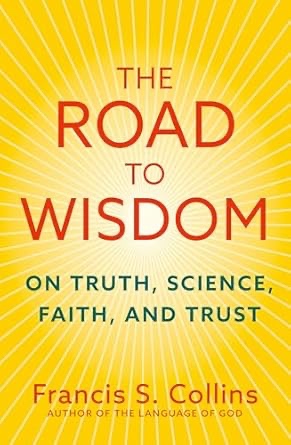The Road to Wisdom: On Truth, Science, Faith and Trust, by Francis S. Collins
'Provides a helpful analysis of different levels of truth and how to discern them, as well as categories of untruth'
 The Road to Wisdom: On Truth, Science, Faith and Trust
The Road to Wisdom: On Truth, Science, Faith and Trust
By Francis S. Collins
Hodder & Stoughton
ISBN: 978-1-399-82231-2
Reviewed by Ernest C. Lucas
Dr Francis Collins is a physician-scientist. He came to prominence as head of the Human Genome Project. From 2009-21 he was Director of the US National Institutes of Health (NIH), serving under three Presidents. He headed up the US vaccine programme during the COVID-19 pandemic.
His experience in the NIH made him aware of ‘just how badly divisiveness and politics have warped our thinking – including our ability to discern truth, our understanding of science, and our anchor to the fundamentals of faith represented in our churches.’
The book is his ‘attempt to “unwarp” us, and help recover what matters most’ (p. 7). The book addresses the situation in the USA but much of it is readily transposable to the UK.
For Collins wisdom is not the same a knowledge, though it depends on it. Wisdom includes the ability to discern reliable truth. This requires discerning which sources of knowledge deserve trust. He sees science as a source of reliable truth in certain areas because of the in-built self-correcting process resulting from requiring reproducible results and peer-review. Much of life lies beyond the purview of science. This includes morality, but wisdom needs a moral framework in decision-making.
Here faith has an important role to play. During the COVID-19 pandemic Collins became very disturbed by how deeply polarised USA society had become. He says that about 230,000 people in the USA died needlessly because of the acceptance of false information from unreliable sources and scepticism about what scientists were saying about COVID and the effectiveness and safety of the vaccines. Even many in the churches were caught up in this.
Collins provides a helpful analysis of different levels of truth and how to discern them, as well as categories of untruth. He illustrates using a ‘web diagram’ of personal beliefs which helps to discern the levels of truth in them, and is also a means of recognizing your in-built biases which hinder discerning truth. He stresses the importance of first genuinely listening to, and trying to understand, people who seem opposed to you, rather than immediately confronting them with your views. This can lead to fruitful dialogue.
He describes his journey from atheism to the position where he was able to put serious faith and rigorous science together. There is helpful advice on discerning which sources and people deserve trust. Such sources need integrity, competence, humility, and aligned values.
By ‘aligned values’ he means some sharing of world views. This is a difficult criterion because, while we need some common ground with sources we trust, we must avoid the ‘echo chamber’ effect of only listening to those we agree with.
Regarding faith he calls for renewal in the church if it is to regain trust in society. He urges taking the Beatitudes (Matt. 5:3-12) and the two great commandments (Matt. 22:36-39) seriously as a way towards this. The book ends with a challenging call to personal commitment, expressed in a Road to Wisdom pledge.
The Revd Dr Ernest C. Lucas, Vice-Principal Emeritus, Bristol Baptist College and Associate Research Fellow, Spurgeon’s College
Baptist Times, 03/01/2025